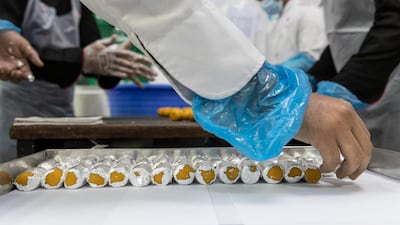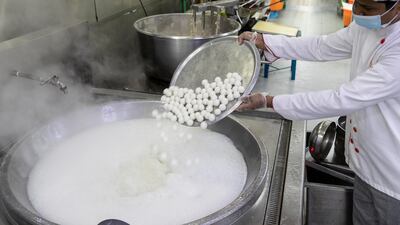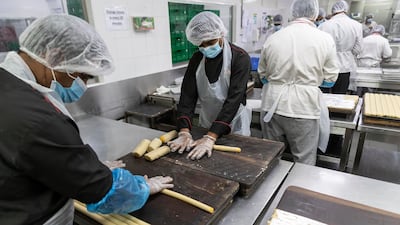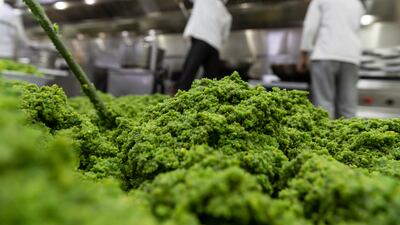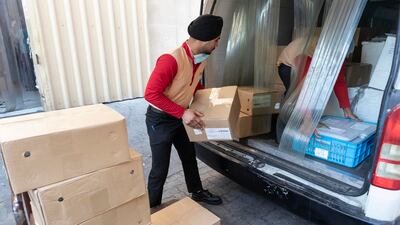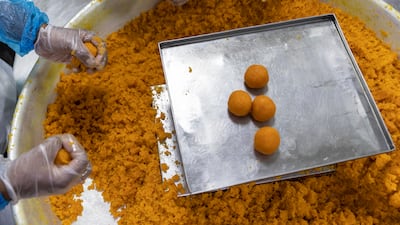Millions of Indians in the UAE are preparing to welcome Diwali next week, and one factory is making sure that the holiday will be all sweetness and light.
The festival of happiness, prosperity and light begins on Monday and is one of the most joyous times of the year for those who celebrate.
One of the most beloved traditions of the holiday period is the chance to spread a little cheer by giving out Diwali sweets, known as mithai.
With an Indian population of about three million in the Emirates, business is booming for traders such as Bikanervala, which this year will have produced 50 tonnes of sweets in the run-up to the holiday.

“We still struggle to meet the demand,” Pankaj Agarwal, director of international operations at Bikanervala, told The National.
“Diwali is the most important festival for Indians. Every year, it is getting bigger as expats wants to stay connected to their culture.
“Diwali is also synonymous with big parties and gifting of sweets. So, the demand starts a month ahead and peaks to the last day of Diwali.”
A mammoth effort for Diwali
At the Bikanervala factory in Dubai Investment Park, a team of 150 cooks and helpers prepares a mind-boggling variety of sweets from scratch daily.
The sprawling 20,000 square foot facility is a hive of activity, with groups of workers busy hand-rolling sweetened dough into perfect balls, squares and cylinders.
Some are supervising the grinding of gram flour while others are making sugar-soaked pistachio and almond fillings.
In a separate corner, milk barfis — a dense milk-based sweet — are coated with chocolate while a helper smears a tray full of pedas — a doughy sweet — with thin silver film.
“This is pure silver that we buy from India,” said Mr Agarwal.
He said the team is divided into four sections — dry fruits, Bengali sweets, ghee and syrup — and each takes care of their respective variety.
“We start at 6am. The first thing we make is laddus [sweets made of flour, ghee and sugar]. The first truck will leave the factory at 8am and will reach our bakeries before 9am.”

Sweet dreams are made of this
Bikanervala has built a flourishing empire from its humble beginnings, when its first small sweet shop was founded in 1905 in Bikaner, a city in the north Indian state of Rajasthan.
It is now a $350 million company with more than 150 outlets in India and other countries such as Singapore, Nepal and New Zealand, in addition to its flagship Bikano packaged sweets and snacks.
There are 18 Bikanervala outlets in the UAE.
During Diwali, thousands of kilograms of dried fruits are imported to the Emirates from the company's warehouses in India, Mr Agarwal said.
About 6,000kg of cashews and 5,000kg of pistachio and almonds are needed per week.
“We use around 3,000 to 4,000 litres of milk daily,” he said.
“Our signature recipes that have been passed down through generations. The Motichoor laddu or the Kajukatli recipe has not been changed in the last 100 years.”
Apart from the traditional varieties, Mr Agrawal said the company also introduces new products every year.
“You have to keep innovating to stay ahead of the game. For instance, this year, we have rose laddus made with fresh rose petals, and chocolate laddus, which are big hits.”
The prices of the sweets vary between Dh50 to Dh300 per kilogram.
One of the most expensive varieties is the Pista Log, which costs about Dh220 per kilogram. Cashew laddus and chocolate laddus cost Dh167 per kilogram, whereas Motichur laddus cost Dh56 per kilogram.
“What Indians [living abroad] miss the most is their culture,” said Mr Agarwal.
“And Indian culture is all about festivals, good food and music. They can never get enough of it.”
